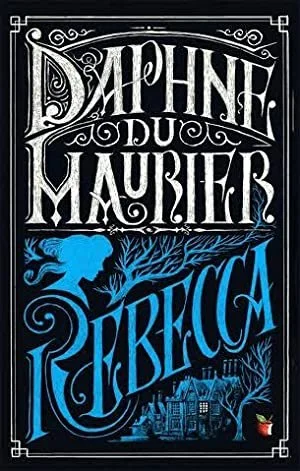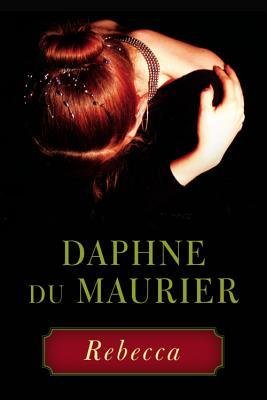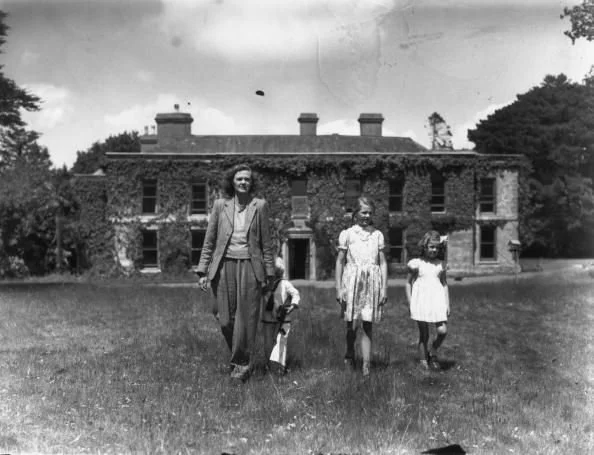Rebecca - Daphne Du Maurier
After dodging it for more than two years, the ‘rona finally caught up with me when I was about halfway through this book. So I had feverish dreams of boarded up rooms with sheet covered furniture, fog shrouded coves and of course the black clad figure of Mrs Danver lurking in corners, grinning manically. So you could say ‘Rebecca’ by Daphne du maurier seeped into my imagination. "Last night I dreamt I went to Manderley again..." indeed.
Manderley
And what an imagination is on display in this book. From the opening chapter, this book absolutely transported me, from the European grandeur of a Monte Carlo hotel, to the aforementioned Manderley, the house that becomes central to the story and an important character in it’s own right. It’s a long time since I read a book that generated such atmosphere with it’s rooms, sloping lawns, stairs and galleries - definitely similar to classical locations such as Thornfield hall in Charlotte Bronte’s ‘Jane Eyre’, Gatsbys house or Pemberley House in ‘Pride and Prejudice.’
I did think of Jane Eyre a couple of times whilst reading ‘Rebecca.’ If I remember correctly, (I studied the book for GCSE English, which wasn’t yesterday or the day before) that narrator also had a vivid imagination, prone to flights of fancy. She’s also something of an unreliable narrator, as she doesn’t know the full story, which is revealed to both her and us slowly, something that also happens here.
Mrs De Winter
The narrators imagination is certainly vivid here - there’s one part that made me laugh, as Mrs De Winter actually play out what’s happening in her head whilst her husband looks on. She’s thinking about Rebecca taking a phone call.
‘Do you know you were going through the most extraordinary antics instead of eating your fish? First you listened as though you heard the telephone, then your lips moved, and you threw half a glance at me. And you shook your head, and smiled and shrugged your shoulders?’
And it’s Mrs De Winter’s vivid imagination that fuels the story - whether it’s imagining the mysterious Rebecca living in Manderley, or picturing a future, or lack of, with her husband. She creates tension, anticipation, dread - all with these flights of fancy. We’re discovering the story through her, and uncovering the secrets at the same time. It’s works perfectly.
Of course our unnamed narrator is forever in Rebecca’s shadow, her presence seeming to be everywhere.
”Rebecca, always Rebecca. Wherever I walked in Manderley, wherever I sat, even in my thought and in my dreams, I met Rebecca. I knew her figure now, the long slim legs, the small and narrow feet. Her shoulders broader than mine, the capable clever hands. Hands that could steer a boat, could hold a horse. Hands that arranged flowers, made the models of ships, and wrote ‘Max from Rebecca’ on the fly-leaf of a book. I knew her face too, small and oval, the clear white skin, the cloud of dark hair. I knew the scent she wore, I could guess her laughter and her smile. If I heard it, even among a thousand others, I should recognise her voice. Rebecca, always Rebecca. I should never be rid of Rebecca.
Mrs Danvers
The moment she appears in the Hall at Manderley you know she’s a formidable character. I immediately imagined her as the English actress Maggie Smith, floating about the halls in her long black dress and giving the narrator the death stare. She remains a mystery throughout and is in some of the books most terrifying momments, espcically one memorable incident at an upstairs window. Rebecca’s number one fan.
Manderley
Like I said earlier, a character in it’s own right. From it’s first appearance at the end of the snaking driveway, it looms up, brooding and atmospheric. Du Maurier’s writing is so clear that I could nearly write down the layout of the rooms, though I’d probably get lost upstairs as I’d be keeping an eye out for ‘Danny.’ Described in incredible detail, down to the surrounding grounds and ornaments.
Psychological Thriller
The first two thirds serve as a build up to the crescendo of the final few chapters, which were relentless and which I read at a frantic pace. I was aware of the Hitchcock film (I also see Netflix has a remake) and thought in my mind I had seen it. But once the couple arrived at Manderly I realised I hadn’t previously seen any productions and it made the book all the better for me. I think it's just one of those books that is culturally familiar.
Summary
I got completely sucked into ‘rebecca’. Classic literature is classic for a reason - it’s stood the test of time and continually hooked new generations of readers. It’s why I don’t really understand the term ‘instant classic’ - it’s only through the passing of time that we’ll know what's a classic and what’s not.
It works brilliantly as a psychological thriller, as a study in jealousy, and the last third is a page turner. It may seem a bit long, but it needs the long build up for the pay off. Even when it seems there’s nothing happening, tension is always slowly building.
And the writing is spectacular. Such power of description, foreshadowing, economy of language. There isn’t a word wasted and it’s perfectly constructed to create atmosphere or add tension. Wonderful storytelling.
You’ll like this if you enjoy psychological suspense or gothic romance
Rebecca by Daphne Du Maurier
449 pages First published January 1, 1938
Du Maurier with her children outside an abandoned house called Menabilly in Fowey, Cornwall, which became the inspiration for Manderley.




